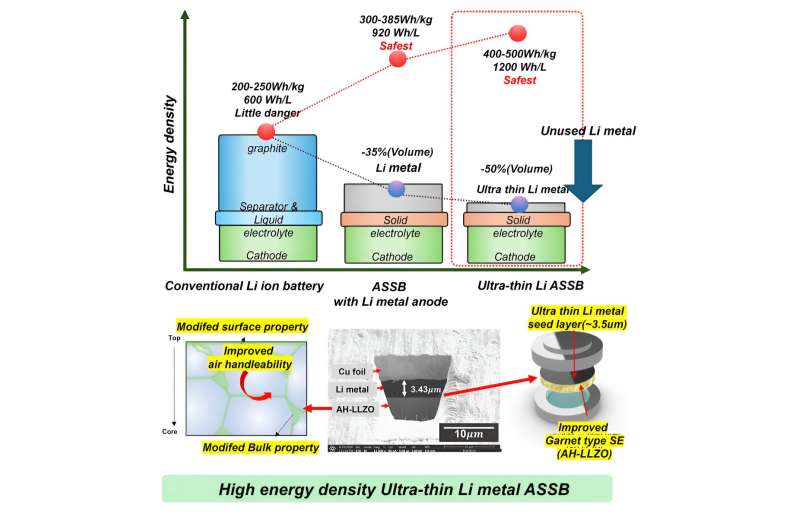#Researchers focus on essentials, addressing inherent issues of solid-state batteries


In facing life’s many challenges, we often opt for complex approaches to finding solutions. Yet, upon closer examination, the answers are often simpler than we expect, rooted in the core “essence” of the issue. This approach was demonstrated by a research team at Pohang University of Science and Technology (POSTECH) in their publication on addressing the inherent issues of solid-state batteries.
Led by Professor Byoungwoo Kang and Dr. Abin Kim from the Department of Materials Science and Engineering at POSTECH, the team recently developed a solid electrolyte with unique properties. This innovation enables an ultra-thin lithium metal solid-state battery platform with high stability and energy density. Their findings were published in the journal ACS Energy Letters.
Solid-state batteries, which use solid electrolytes instead of liquids to enhance energy density and safety, are considered the next generation of batteries and are often called “dream batteries.” Among these, the garnet-type oxide solid electrolyte (Li7La3Zr2O12, or LLZO) has high ionic conductivity. However, LLZO is highly reactive and forms a contamination layer (Li2CO3) on its surface when exposed to air. This layer acts as a resistive barrier in cell construction, diminishing the contact and interfacial properties of the electrolyte and reactants, especially with the lithium (Li) metal anode.
Currently, various approaches are being explored to address these issues such as coating the LLZO surface or using additional chemical or heat treatment processes post-synthesis. While these methods improve the situation, they do not completely resolve the problem as the LLZO is again exposed to the atmosphere, leading to the reformation of the contamination layer.
The research team focused on the “LLZO” itself rather than developing an effective coating or additional processes. By focusing on the essentials, they created an air-handleable LLZO (AH-LLZO) technology that simultaneously enhances the surface and internal properties of LLZO, preventing the formation of contaminant layers in the first place.
Experiments demonstrated that the developed garnet-type solid electrolyte inhibited contamination layer formation by creating a new hydrophobic compound (Li-Al-O) on both the surface and inside the material. As a result, even if a contamination layer forms, it barely reacts with moisture in the air, effectively preventing it from spreading internally. This advancement improved contact (and wettability) with lithium metal, allowing the team to develop ultra-thin (~3.43 μm) lithium solid-state batteries, approximately one-tenth the thickness of a human hair.
The significance of this research lies in the ability to prepare ultra-thin lithium metal layers, resulting in very low capacity ratio of the anode to cathode, ~ 0.176 in solid-state batteries through a simple wetting process without complex post-processing steps.
This innovation allows for a significant reduction in the amount of lithium metal used, thereby decreasing the overall battery weight and volume and dramatically improving energy density. Additionally, the technology enables storage in air without the need for special handling or facilities, simplifying the process and enhancing the practical usability of garnet-type solid electrolytes.
Professor Byoungwoo Kang said, “We have solved the problem of LLZO’s inherent contaminant layer without the need for a post-processing step. We will continue to work on ultra-thin lithium metal solid-state batteries that can achieve high safety and high energy density.”
Abin Kim et al, High Energy Density Ultra-thin Li Metal Solid-State Battery Enabled by a Li2CO3-Proof Garnet-Type Solid Electrolyte, ACS Energy Letters (2024). DOI: 10.1021/acsenergylett.4c00217
Citation:
Researchers focus on essentials, addressing inherent issues of solid-state batteries (2024, June 11)
retrieved 11 June 2024
from https://techxplore.com/news/2024-06-focus-essentials-inherent-issues-solid.html
This document is subject to copyright. Apart from any fair dealing for the purpose of private study or research, no
part may be reproduced without the written permission. The content is provided for information purposes only.
If you liked the article, do not forget to share it with your friends. Follow us on Google News too, click on the star and choose us from your favorites.
If you want to read more Like this articles, you can visit our Science category.



